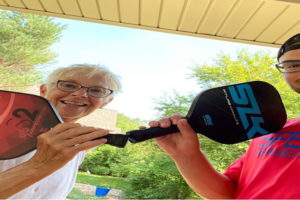Now is a great time to get out and enjoy opportunities for fun. Maybe it is a walk in the park, looking around and enjoying the birds and nature. Or it may be watching your child or grandchild’s soccer game or even playing lawn games like bocce ball at home! Or maybe it is getting out and enjoying dining in a restaurant with friends or a musical performance.
But if you feel your balance is not good and you are worried about a fall or injury, you may miss out on all these and many other fun opportunities. Don’t let concerns about balance hold you back! You can improve your balance. The first step is determining the cause and then developing a plan to address it.
Here is information to help you get back to activities that are important to you.
Common Conditions that Affect Your Balance
Balance is a broad term and can be affected by so many factors. Your balance can be affected because of:
- Tight/inflexible muscles
- Weaker muscles
- Abnormal sensation (numbness/tingling)
- Visual problems
- Inner ear problems
- Anxiety or fear of falls
These factors play a role on how we are able to sense information for balance and then how our muscles and nerves respond. Sometimes if those systems aren’t giving us fast enough or accurate information, we cannot react fast enough and feel unsteady.
Emotions also play a role. If we have a history or near falls or instances of instability, we may be anxious or fearful of falls. Then we self-limit, meaning we stop doing these or other activities because of this fear. As we decrease our activity, our muscles can get weaker and our joints/muscles get less flexible which makes activities that were previously easier to do harder. It is a circle that just keeps expanding and can eventually have some significant negative impacts on our mobility and overall health!
Ways to Improve Your Balance
There are several activities that can help improve your balance. You can do these on your own, or you may want to have an assessment by a physical therapist trained in balance problems to identify specific causes and create a customized program to improve your balance.
Activities You Can Do on Your Own
- Walking, biking and climbing stairs are good ways to strengthen muscles in your lower body; a recumbent bike is a safe way to start if you have significant concerns about your balance
- Stretching loosens your muscles and can reduce tightness and inflexibility
- Yoga strengthens and stretches muscles; Tai Chi moves, which are gradual shifts in weight from one foot to another with additional moves, offers a good approach to improve balance
Benefits of Working with a Physical Therapist
Physical therapy is a way to identify factors that affect your balance and help you gain confidence with your activities. A physical therapist can help assess areas that can play a role in your day-to-day activities.
Stretching programs and certain strengthening activities can help target those areas if needed. Other activities can be designed to increase stability when doing specific tasks that you have avoided because of your balance such as walking and turning your head, walking on unlevel/unpredictable surfaces or being able to adjust your body positioning when in crowded areas.
In addition to strengthening exercises, physical therapy teaches you ways to make adjustments as needed based on your activities! We want you to be able to enjoy your life and not miss out on all those important and fun times!
Take Steps Now to Improve Your Balance and Your Life
Bryan Health has physical therapists trained in balance problems to help you on the path to a life with better balance. The Bryan Center for Dizziness and Balance provides more information about balance, ways to improve it and innovative treatment approaches.

Laura Corbridge
Bryan Health Physical Therapist
Laura Corbridge received her master’s degree in physical therapy from the University of Iowa in 1999. She has worked with both adult and pediatric patients and specializes in treating those with neurological disorders including traumatic brain injury, stroke and other progressive neurological disorders. She also treats patients with chronic lung conditions. Laura has had advanced training in balance and vestibular rehabilitation including Neurocom Balance master integration training and Emory University’s certification of vestibular competency. Laura provides comprehensive vestibular balance testing services and pulmonary therapy.








